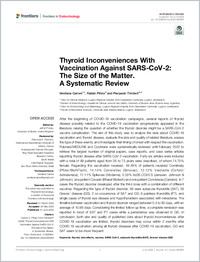Thyroid inconveniences with vaccination against SARS-CoV-2 : the size of the matter : a systematic review
- Caironi, Verdiana Clinic for Internal Medicine, Lugano Regional Hospital, Ente Ospedaliero Cantonale, Lugano, Switzerland
- Pitoia, Fabián ORCID Division of Endocrinology, Hospital de Clínicas José de San Martin, University of Buenos Aires, Buenos Aires, Argentina
- Trimboli, Pierpaolo ORCID Clinic for Endocrinology and Diabetology, Lugano Regional Hospital, Ente Ospedaliero Cantonale, Lugano, Switzerland - Faculty of Biomedical Sciences, Università della Svizzera italiana, Switzerland
- 2022
Published in:
- Frontiers in endocrinology. - 2022, vol. 13, p. 900964
English
After the beginning of COVID-19 vaccination campaigns, several reports of thyroid disease possibly related to the COVID-19 vaccination progressively appeared in the literature, raising the question of whether the thyroid disorder might be a SARS-CoV-2 vaccine complication. The aim of this study was to analyze the data about COVID-19 vaccination and thyroid disease, evaluate the size and quality of related literature, assess the type of these events, and investigate their timing of onset with respect the vaccination. Pubmed/MEDLINE and Cochrane were systematically reviewed until February 2022 to retrieve the largest number of original papers, case reports, and case series articles reporting thyroid disease after SARS-CoV-2 vaccination. Forty-six articles were included with a total of 99 patients aged from 26 to 73 years were described, of whom 74.75% female. Regarding the vaccination received, 49.49% of patients received Comirnaty (Pfizer/BioNTech), 14.14% CoronaVac (Sinovac), 12.12% Vaxzevria (Oxford/Astrazeneca), 11.11% Spikevax (Moderna), 3.03% Ad26.COV2.S (Janssen, Johnson & Johnson), one patient Covaxin (Bharat Biotech) and one patient Convidecia (Cansino). In 7 cases the thyroid disorder developed after the third dose with a combination of different vaccines. Regarding the type of thyroid disorder, 59 were subacute thyroiditis (SAT), 29 Graves’ disease (GD), 2 co-occurrence of SAT and GD, 6 painless thyroiditis (PT), and single cases of thyroid eye disease and hypothyroidism associated with mixedema. The timeline between vaccination and thyroid disorder ranged between 0.5 to 60 days, with an average of 10.96 days. Considering the limited follow-up time, a complete remission was reported in most of SAT and PT cases while a persistence was observed in GD. In conclusion, both size and quality of published data about thyroid inconveniences after COVID-19 vaccination are limited; thyroid disorders may occur within 2 months after COVID-19 vaccination; among all thyroid diseases after COVID-19 vaccination, GD and SAT seem to be more frequent.
- Collections
- Language
-
- English
- Classification
- Medicine
- License
- Open access status
- gold
- Identifiers
-
- DOI 10.3389/fendo.2022.900964
- ARK ark:/12658/srd1326724
- Persistent URL
- https://n2t.net/ark:/12658/srd1326724
Statistics
Document views: 94
File downloads:
- Trimboli_2022_Frontiers_FrontEndocrinol: 147
